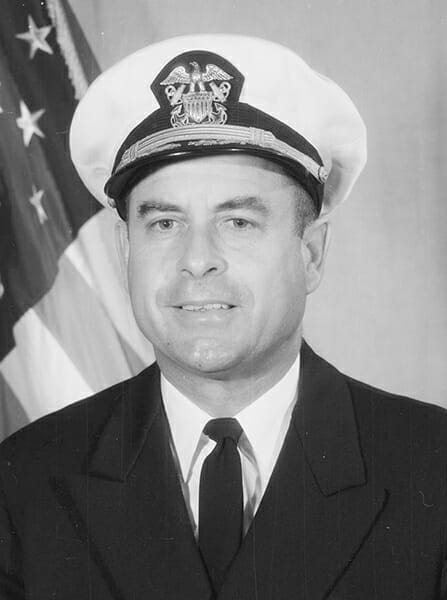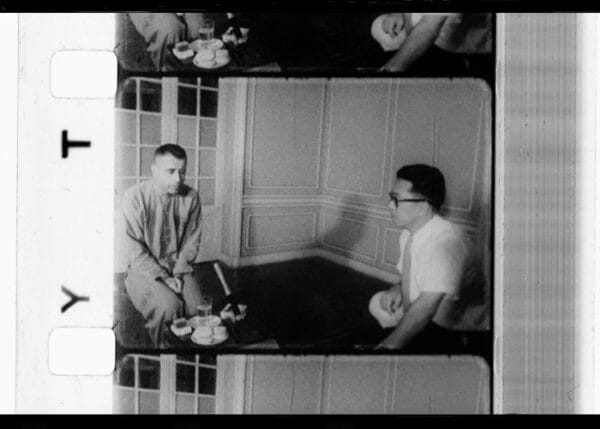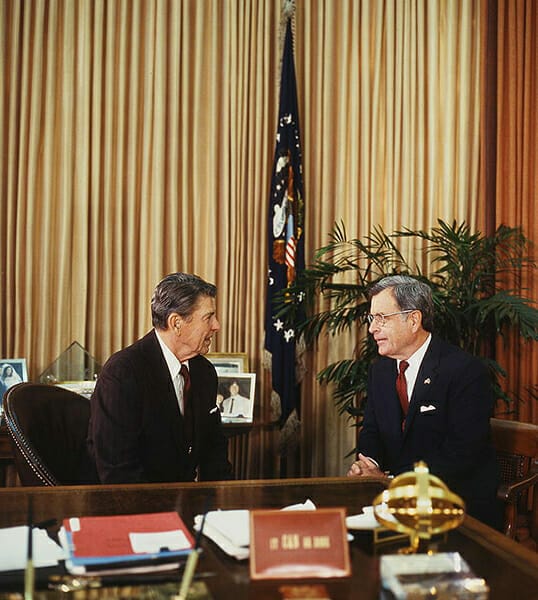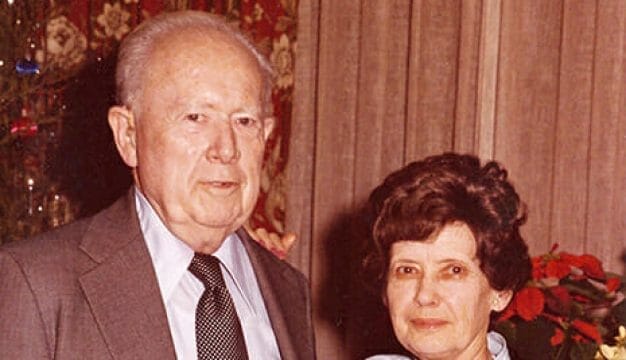Jeremiah Denton Jr.
A native of Mobile, Mobile County, Jeremiah A. Denton Jr. (1924-2014) was the first Republican senator elected from Alabama since the end of the Reconstruction era. While in the U.S. Senate and during his career thereafter, Denton advocated positions based in his conservative Catholic upbringing, working to restrict funding for abortions, eliminate teenage pregnancy, and allow prayer in public schools. He is also widely remembered for his lengthy time spent as a prisoner of war (POW) in North Vietnam while serving in the U.S. Navy and his strong advocacy for national defense.
 Jeremiah Denton
Denton was born in Mobile on July 15, 1924, to Jeremiah Denton Sr. and Irene Claudia Steele Denton, whose family traced its heritage back to the French Catholic founders of Mobile. During Denton’s childhood, his father held a variety of jobs and moved the family often, prompting his mother to return to Mobile with Jeremiah and his two brothers and later divorce his father. Denton graduated from McGill Institute, where he excelled at sports and was voted class president. He also attended Spring Hill College in Mobile, joining the ROTC program and successfully working for an appointment to the U.S. Naval Academy. He graduated with honors on June 5, 1946, and married Jane Maury, whom he met shortly after high school, the following day. The couple would have seven children.
Jeremiah Denton
Denton was born in Mobile on July 15, 1924, to Jeremiah Denton Sr. and Irene Claudia Steele Denton, whose family traced its heritage back to the French Catholic founders of Mobile. During Denton’s childhood, his father held a variety of jobs and moved the family often, prompting his mother to return to Mobile with Jeremiah and his two brothers and later divorce his father. Denton graduated from McGill Institute, where he excelled at sports and was voted class president. He also attended Spring Hill College in Mobile, joining the ROTC program and successfully working for an appointment to the U.S. Naval Academy. He graduated with honors on June 5, 1946, and married Jane Maury, whom he met shortly after high school, the following day. The couple would have seven children.
While in the Navy, Denton served as a test pilot, flight instructor, and squadron leader. He was stationed in many places, including Florida, Hawaii, Maryland, New Jersey, Virginia, and France as part of the Sixth Fleet in the Mediterranean Sea. He also developed nuclear weapons strategies and tactics for the Navy. In 1963, he returned to school, attending the Naval War College in Newport Rhode Island and earning a masters’ degree in international relations from George Washington University in Washington, D.C. in 1964. The following year in June, he was assigned to the USS Independence (CVA-62), which was deployed off the coast of North Vietnam.
 Jeremiah Denton POW Footage
Days after assuming command of an attack squadron, on July 18, 1965, Denton led a bombing mission over North Vietnam and was shot down and captured. He spent 48 of his 91 months of imprisonment in solitary confinement, one of the longest periods of any American POW. Denton gained national attention in 1966 when he was observed blinking T-O-R-T-U-R-E in Morse Code while being interviewed by a Japanese television film crew for a North Vietnamese propaganda film. The film was smuggled out and sold by the film crew to a U.S. television network and played on national television; it confirmed that American POWs were being subjected to torture. Denton subsequently received the worst of many torture sessions that had occurred during the early years of his confinement.
Jeremiah Denton POW Footage
Days after assuming command of an attack squadron, on July 18, 1965, Denton led a bombing mission over North Vietnam and was shot down and captured. He spent 48 of his 91 months of imprisonment in solitary confinement, one of the longest periods of any American POW. Denton gained national attention in 1966 when he was observed blinking T-O-R-T-U-R-E in Morse Code while being interviewed by a Japanese television film crew for a North Vietnamese propaganda film. The film was smuggled out and sold by the film crew to a U.S. television network and played on national television; it confirmed that American POWs were being subjected to torture. Denton subsequently received the worst of many torture sessions that had occurred during the early years of his confinement.
While in prison, Denton urged other prisoners to resist their captors to maintain morale and discipline and was promoted to captain. During this time, Jane Denton became a vocal advocate for improving the treatment of POWs and was credited with helping to hasten their release. After the Paris Peace Accords were signed, Denton was on the first planeload of U.S. prisoners released February 12, 1973, and as the ranking officer, was the first to exit the plane at Clark Air Base in the Philippines. He was greeted there by Commander in Chief of the United States Pacific Command and fellow Alabamian Noel Gayler. In April 1973, he was promoted to rear admiral and after arriving in his hometown of Mobile, received a hero’s welcome with one of the largest parades in the city’s history. Denton then served as commandant of the Armed Forces Staff College in Norfolk, Virginia, until he retired, with numerous military decorations, from the Navy in 1977. He also wrote a book, When Hell Was in Session, recounting his POW experiences, that was made into an NBC television movie in 1979 starring Hal Holbrook. Denton strongly defended most of America’s actions in Vietnam.
Shortly after returning to Mobile in 1977, Denton founded the Coalition for Decency in response to a perceived decline in America’s moral values. Denton targeted the entertainment industry and was particularly distressed by the legalization of abortion and the increase in illicit drug use and the sexual revolution that had occurred during the time of his imprisonment. In 1983, he would reinvent the Coalition for Decency as the National Forum Foundation, and it would serve as a platform to promote conservative social views and increased military spending.
In 1979, Alabama Republicans asked Denton to run for the Senate against the increasingly vulnerable incumbent, Democrat Donald W. Stewart, but he declined. After the party recruited former Democratic congressman Armistead I. Selden, Denton changed his mind and declared his candidacy for the primary, claiming he did so because he believed that Pres. Jimmy Carter’s response to the recent Soviet invasion of Afghanistan was inadequate. In somewhat of an upset, he eliminated Selden and went on to defeat James Folsom Jr., who had beaten Stewart in the Democratic primary.
In the Senate, Denton served on the Labor and Human Resources Committee and chaired its subcommittee on aging, family, and human services, as well as the Senate Judiciary, Veterans Affairs, and Armed Services committees. He supported legislation promoting abstinence education for unmarried teenagers and authored the Adolescent Family Life Act, which provided services for pregnant teenagers while also involving the teens’ parents and promoting adoption as an option. A staunch opponent of abortion, he helped pass legislation prohibiting the use of federal money to fund the procedure for participants in certain federal health care programs. He promoted the Equal Access Act, which has enabled religious organizations to use school property on equal terms with other organizations, and he spoke out against the U.S. Supreme Court’s decision in Wallace vs. Jaffree, which overturned Alabama’s law allowing for one minute of silence in public schools.
 Sen. Jeremiah Denton and Pres. Ronald Reagan
On the Judiciary Committee, Denton was involved in the Senate hearings to confirm Sandra Day O’Connor as Supreme Court justice. He expressed frustration that O’Connor would not say how she would vote on abortion and right-to-life cases, possibly setting a precedent for future nomination hearings. Denton ultimately abstained from voting and was the only senator who did not vote in favor of O’Connor’s confirmation. In contrast to Alabamian Howell Heflin, Denton supported future senator Jeff Sessions in a failed bid for a federal judgeship. In addition, he opposed an extension and amendment of the Voting Rights Act of 1965 because he claimed it unfairly penalized the South and had subjected Mobile to a lengthy lawsuit, Mobile v. Bolden (1980). Denton served as chair of its subcommittee on security and terrorism, successfully sponsoring numerous pieces of anti-terrorist legislation. He also created a program to supply humanitarian assistance to civil-war-torn El Salvador that was implemented in other countries and pushed reforms to ease the route to U.S. citizenship for children in Asia who were born out of wedlock to U.S. servicemen. Throughout his career in the Senate, Denton frequently worked with Democrats to find solutions without sacrificing his principles.
Sen. Jeremiah Denton and Pres. Ronald Reagan
On the Judiciary Committee, Denton was involved in the Senate hearings to confirm Sandra Day O’Connor as Supreme Court justice. He expressed frustration that O’Connor would not say how she would vote on abortion and right-to-life cases, possibly setting a precedent for future nomination hearings. Denton ultimately abstained from voting and was the only senator who did not vote in favor of O’Connor’s confirmation. In contrast to Alabamian Howell Heflin, Denton supported future senator Jeff Sessions in a failed bid for a federal judgeship. In addition, he opposed an extension and amendment of the Voting Rights Act of 1965 because he claimed it unfairly penalized the South and had subjected Mobile to a lengthy lawsuit, Mobile v. Bolden (1980). Denton served as chair of its subcommittee on security and terrorism, successfully sponsoring numerous pieces of anti-terrorist legislation. He also created a program to supply humanitarian assistance to civil-war-torn El Salvador that was implemented in other countries and pushed reforms to ease the route to U.S. citizenship for children in Asia who were born out of wedlock to U.S. servicemen. Throughout his career in the Senate, Denton frequently worked with Democrats to find solutions without sacrificing his principles.
Finding little time to campaign in Alabama for his reelection, Denton was narrowly defeated in the 1986 election by U.S. congressman Richard Shelby, who was then a Democrat. After leaving the Senate, Denton remained active promoting conservative views and advocating for strong national defense. He continued to lead the National Forum Foundation, which became the Admiral Jeremiah Denton Foundation in 2004, headquartered in Mobile. It now has several affiliate offices. The organization provides humanitarian assistance and development programs overseas and advocates against the separation of church and state in the United States. In September 2007, Denton and his wife moved to Williamsburg, Virginia, where Jane died the following November. In 2011, he married Mary Belle Bordone. Denton continued to serve on a number of college and foundation boards and attend speaking engagements until his death on March 28, 2014. Denton was buried with full military honors in Arlington National Cemetery in Arlington, Virginia, on July 22, 2014. Denton’s senatorial and campaign papers are housed at Auburn University‘s Special Collections and Archives in the Ralph Brown Draughon Library. In 2019, the U.S. Navy named a destroyer in Denton’s honor.
Note: This entry was adapted with permission from Alabama United States Senators by Elbert L. Watson (Huntsville, Ala: Strode Publishers, 1982).
Additional Resources
Denton, Jeremiah. When Hell was in Session. Chappaqua, N.Y.: Readers Digest Press, 1976.
Duggan, Joseph P. Jeremiah Denton. Mobile: Traditional Press, 1986.



